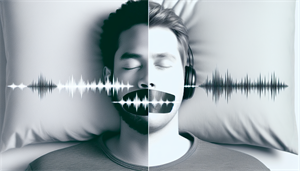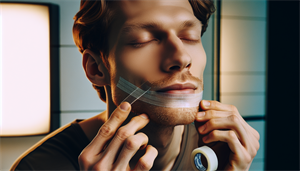Desperate for a snore-free night, many are asking: does mouth tape stop snoring? This succinct exploration provides answers, backed by evidence, highlighting the potential and limitations of mouth tape in the battle against snoring, while also offering a comparative look at alternate snoring solutions.
Key Takeaways
-
Mouth taping is a practice intended to encourage nasal breathing during sleep, which may reduce snoring and improve symptoms of mild obstructive sleep apnea, as well as other benefits such as less fatigue and better sleep quality.
-
Scientific studies suggest mouth taping can be effective for snorers who predominantly breathe through their mouths, but sleep medicine experts have not reached a consensus on recommending it as a standard treatment for snoring or sleep apnea.
-
Alternative anti-snoring devices, such as mouthpieces, nasal strips, and chin straps, as well as lifestyle changes, may offer more reliable solutions and are worth considering before trying mouth taping, which should be done with caution and proper materials.
Exploring the Snore-Stopping Potential of Mouth Taping

If you’re taken aback by the thought of nighttime mouth taping, we don’t blame you. It does sound like something straight out of a sitcom! However, mouth taping is more than a viral trend; it’s a technique some individuals swear by in their quest for a snore-free sleep. Essentially, mouth taping involves applying a piece of porous tape over both the upper and lower lips, keeping the mouth shut, and encouraging nose breathing. It’s like a ‘Do Not Disturb’ sign for your mouth, with the purported benefits of reducing snoring and even improving mild obstructive sleep apnea.
Despite its simplicity, mouth taping is rooted in complex physiological principles. It forces you to breathe through your nose, which can help prevent mouth breathing and snoring. But beyond the realm of snoring, advocates of mouth taping profess an array of additional benefits. The effects of mouth taping can lead to improvements in:
-
fatigue
-
concentration issues
-
sleep quality
-
dry mouth
-
asthma
But before you reach for that roll of tape, let’s delve deeper into the theory behind mouth taping and its effectiveness.
The Theory Behind Mouth Taping and Nasal Breathing
The principles of mouth taping tie into the physiological aspects of breathing. When we breathe through our nose, we enhance nasal airway resistance and decrease congestion or obstruction, which encourages nose breathing and reduces snoring. By acting as a physical barrier that keeps the mouth shut, mouth taping amplifies this process, discouraging mouth breathing and promoting nasal breathing instead.
The effectiveness of mouth taping in reducing snoring isn’t just anecdotal; there’s scientific research to back it up. Studies have shown that mouth taping during sleep can improve snoring and reduce the severity of sleep apnea in individuals who predominantly breathe through their mouth and have mild obstructive sleep apnea.
Can Mouth Taping Keep Your Mouths Closed All Night Long?
While mouth taping seems to have its merits, you may be wondering, “Can it keep my mouth closed all night long?” The answer isn’t a straightforward ‘yes’ or ‘no’. Research has indicated that mouth taping can indeed improve snoring and reduce the severity of sleep apnea in mouth-breathers with mild OSA. It is vital, however, to use a safe and porous tape instead of duct tape, which can cause discomfort and potentially harm.
Furthermore, while mouth taping might help with snoring in certain situations, there’s limited evidence to support its effectiveness in maintaining uninterrupted sleep throughout the night. Plus, it can potentially have adverse effects on breathing. Possible side effects may include:
-
a dry or scratchy throat
-
bad breath
-
snoring
-
allergic reactions
-
skin irritation or rash
-
exacerbated breathing problems
-
implications for sleep quality such as poor sleep, anxiety, and irritation.
The Verdict from Sleep Medicine: Is Mouth Taping a Proven Method?
Considering the potential benefits and risks of mouth taping, what stance does sleep medicine take? According to clinical studies, mouth taping during sleep has been found to improve snoring and reduce the severity of sleep apnea in mouth breathers with mild OSA. These studies have shown that mouth taping can not only reduce snoring but also decrease tiredness in such individuals.
However, the sleep medicine community hasn’t reached a consensus on the effectiveness of mouth taping. While it has demonstrated improvements in cases of mild OSA and snoring, there’s no definitive agreement regarding its effectiveness as a widely recommended treatment. At present, mouth taping is not widely acknowledged as a proven method for reducing snoring within the realm of sleep medicine, although there is some evidence indicating potential benefits for mouth-breathers with mild obstructive sleep apnea.
With no clear consensus, it becomes necessary to explore other alternatives for managing snoring. Let’s compare mouth taping with other anti-snoring devices, such as:
-
Mouthpieces
-
Nasal strips
-
Chin straps
-
Anti-snoring pillows
to see if an alternative solution might be more effective.
Mouth Tape vs. Other Anti-Snoring Devices

If mouth taping isn’t widely endorsed, you might start to question the existence of other alternatives. Absolutely! A wide range of anti-snoring devices are available, including:
-
Nasal strips
-
Nasal dilators
-
Anti-snoring mouthpieces
-
Chin straps
These devices aim to alleviate snoring by targeting various root causes, such as constricted nasal passages or unfavorable tongue and jaw positions during sleep.
Among the various options, mouthpieces have gained attention for their ability to reduce snoring and enhance breathing, possibly providing a more reliable solution than mouth taping.
Why a Mouthpiece Might Be a Better Option
Unlike mouth taping, which simply keeps the mouth shut, mouthpieces for snoring work by:
-
Moving the lower jaw forward to maintain an open airway during sleep, which enables unrestricted airflow
-
Reducing snoring and tiredness in individuals with obstructive sleep apnea
-
Slowing breathing
-
Filtering allergens
-
Easing congestion
This mechanism of action offers more advantages than mouth taping.
Research has demonstrated the efficacy of mouthpieces in reducing snoring and obstructive breathing episodes during sleep. Additionally, they can improve daytime sleepiness, cognitive function, blood pressure, and overall sleep quality. However, it’s important to note that using a mouthpiece for snoring can have potential discomforts or adverse effects such as excess salivation, temporomandibular joint pain, dental discomfort, myofacial discomfort, drooling, sore teeth and gums, a slight change in the bite upon waking up, and slight jaw pain.
Best Mouthpieces For Snoring
If you’re contemplating using a mouthpiece for snoring, you might find yourself questioning which one to opt for. Some of the top-rated mouthpieces for reducing snoring include:
-
SnoreRx Mouthpiece
-
ZQuiet Anti-Snoring Mouthpiece
-
VitalSleep Anti-Snoring Mouthpiece
-
SmartGuard Anti-Snore Device
These mouthpieces function by either advancing the lower jaw to keep the airway open during sleep or by restricting the movement of the tongue at night to prevent airway obstruction, ultimately reducing snoring.
When choosing a snoring mouthpiece, you should consider various features including:
-
A custom-moldable design
-
Adjustable fit
-
Ability to allow jaw movement
-
Inclusion of breathing vents
-
High-quality materials
-
A slim, properly sized design for comfort
While every person’s needs and preferences may vary, these features can help you choose a mouthpiece that is both effective and comfortable for you.
Safety Considerations When Trying Mouth Taping
While mouth taping might seem a straightforward remedy for snoring, one should not disregard the safety considerations and potential hazards. On one hand, using mouth taping as a remedy for snoring can pose risks, as it may impede breathing and hinder the ability to take deep breaths, especially if the individual is unable to breathe through the nose. On the other hand, there are certain precautions that should be taken when using mouth tape for snoring.
It’s not advisable to use mouth tape without considering the potential risks and side effects. Some common mistakes to avoid when applying mouth tape to stop snoring include:
-
Not addressing the underlying cause of snoring
-
Not considering nasal breathing difficulties
-
The potential to aggravate skin irritation or claustrophobia in individuals who already struggle with therapies like CPAP
Therefore, it’s important to seek guidance from a sleep specialist or another healthcare professional before starting to use mouth tape for snoring.
Practical Guide to Mouth Taping

If you’ve assessed the benefits and drawbacks and decided to try mouth taping, here are some practical tips to start. Before attempting mouth taping for snoring prevention, it is important to consider potential risks such as hampered breathing, disrupted sleep, and skin irritation.
Using the right materials is also crucial. Adhesive strips designed specifically for this purpose, such as 3M Micropore Tape, Nexcare Sensitive Skin Tape, and SomniFix Mouth Strips, offer a secure and safe sleep experience.
Precautions Before Taping Your Mouth
Before embarking on the mouth taping journey, you must consider several precautions. One of the most important things to remember is that mouth taping can have negative effects if one is unable to breathe comfortably through the nose, as it may cause discomfort and restrict airflow, especially for individuals who already struggle with nasal breathing.
Therefore, ensuring you can breathe comfortably through your nose is paramount before you attempt mouth taping. If you have any respiratory issues or difficulty breathing through the nose, it’s advisable to consult a healthcare professional before you start taping your mouth. This will help assess the safety and appropriateness of mouth taping or suggest alternative treatments based on your specific situation.
How to Apply Tape Without Causing Skin Irritation
The process of applying mouth tape without causing skin irritation requires careful handling. The type of tape you use can have a significant impact on comfort and skin health. Recommended types of skin-safe tape for mouth taping include:
-
Hostage Tape
-
3M Micropore Tape
-
Nexcare Sensitive Skin Tape
-
Kinesiology tape
Before applying the tape, ensure your skin is clean and dry. Any lotions or oils should be removed from the skin before applying the tape. Applying a food-safe gel or oil around your mouth before using mouth tape can help minimize irritation and leftover stickiness. It is a good way to enhance comfort while using mouth tape..
If you do experience any discomfort or skin reaction, remove the tape immediately and gently wash the skin with warm, soapy water to remove excess adhesive.
Alternatives to Mouth Taping for Reducing Snoring

Although mouth taping might be beneficial for some, it isn’t the sole solution for snoring. Nasal devices like nasal strips and dilators, along with lifestyle changes, are available as alternatives to mouth taping for reducing snoring. These options may be more suitable for individuals who are unable or uncomfortable with taping their mouths shut at night, or for those who did not see significant improvements with mouth taping.
The Role of Nasal Strips and Dilators
Nasal strips and dilators are simple yet effective tools for reducing snoring. Nasal strips adhere to the outside of the nose, physically pulling open the nasal passages, while nasal dilators are inserted into the nostrils to hold them open from the inside. Both of these devices aim to improve airflow and reduce snoring.
While both nasal strips and dilators enhance airflow, they target the issue differently. Nasal strips have been proven to alleviate nasal congestion and improve breathing, while nasal dilators have not shown similar improvements in obstructive sleep apnea outcomes. Additionally, using nasal strips or dilators may help strengthen orofacial muscles, potentially offering advantages over mouth taping by reducing mouth breathing and snoring.
However, it’s worth noting that the adhesive in nasal strips can cause skin irritation in some users.
Lifestyle Changes for Better Breathing at Night
In addition to devices and mouth taping, various lifestyle changes can aid in reducing snoring. Maintaining a healthy weight can impact snoring by reducing the presence of neck fat and soft tissue in the mouth and throat, which can interfere with breathing during sleep. Additionally, physical exercise can reduce snoring severity by reducing body weight and abdominal fat.
Consuming alcohol before bedtime can heighten the chances of snoring due to its effect on relaxing the muscles in the mouth and throat, potentially leading to a higher risk of obstruction during sleep. To reduce snoring, you can:
-
Change your sleep position to keep the airway open
-
Avoid alcohol before bedtime
-
Use an anti-snore pillow to elevate your head
-
Regularly practice mouth and throat exercises over time
These practices can all contribute to better breathing at night, encourage breathing, and help reduce snoring.
When to Consult a Doctor About Your Snoring
Keep in mind that snoring can occasionally signify a more serious underlying condition like sleep apnea, which is a type of sleep disorder. If your snoring is consistently loud and is accompanied by symptoms such as daytime sleepiness, gasping or choking during sleep, or if it significantly affects your or your partner’s sleep quality, it’s time to consult a professional.
A doctor can assist in managing snoring by suggesting lifestyle adjustments such as weight loss, avoiding alcohol before bedtime, and addressing nasal congestion. They can also recommend devices like nasal resistance valves or anti-snoring mouthpieces, and in some cases, may suggest surgery or a CPAP device to address the underlying causes of snoring. Therefore, before trying mouth taping or any other self-administered solutions, it’s imperative to seek medical advice and comprehend the root cause of your snoring.
Summary
In conclusion, mouth taping can be a potential solution for reducing snoring and improving mild obstructive sleep apnea, especially in individuals who breathe through the mouth. However, it’s not a definitive solution and may not work for everyone. The effectiveness of mouth taping in preventing snoring is still inconclusive, with limited research and mixed results.
While mouth taping seems promising, it’s important to also consider other anti-snoring devices like mouthpieces and nasal strips, which can be more effective in improving breathing and reducing snoring. Moreover, lifestyle changes can play a significant role in reducing snoring. Always consult a healthcare professional or a sleep specialist before trying any new treatment for snoring to ensure it’s safe and effective for you.
Frequently Asked Questions
Can taping your mouth stop snoring?
Yes, taping your mouth can help reduce snoring if you can breathe effectively through your nose.
Does mouth taping really work?
Mouth taping does not have enough scientific evidence to support its benefits and can be dangerous, as it may lead to mouth breathing which is associated with certain health issues.
What is the best thing for mouth snoring?
The best thing for mouth snoring is a mouthpiece, like a mandibular advancement device (MAD), which fits inside the mouth and pushes the lower jaw forward to open up the airway. This can help reduce snoring effectively.
Is it safe to use mouth tape for snoring?
Using mouth tape for snoring can pose risks such as breathing issues, disrupted sleep, and skin irritation, so it's important to consult a healthcare professional before trying it.
How can I apply mouth tape without causing skin irritation?
To apply mouth tape without causing skin irritation, use skin-safe tape like Hostage Tape, 3M Micropore Tape, Nexcare Sensitive Skin Tape, or kinesiology tape, and ensure your skin is clean and dry before application. Consider using a food-safe gel or oil around your mouth to further minimize irritation.

